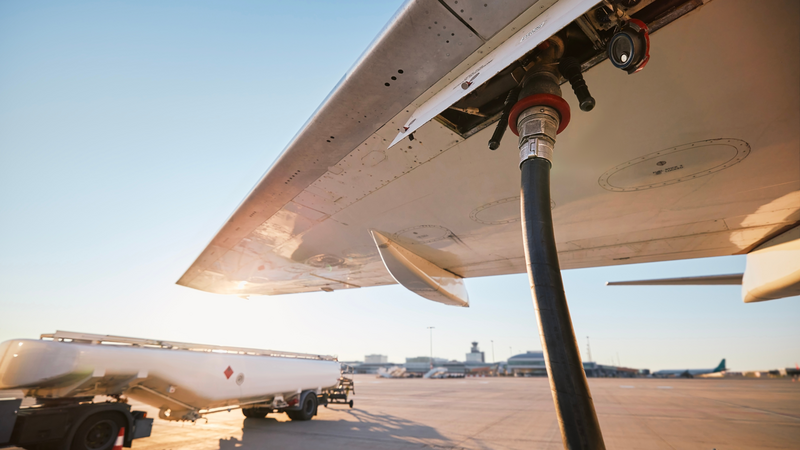The Department for Transport (DfT) has announced measures to support green aviation fuel producers, including a revenue certainty scheme and an additional £400,000 in funding.
On 1 January 2025, the UK’s sustainable aviation fuel (SAF) mandate came into force, which requires the flight sector to supplant 2% of its jet fuel demand with SAF in flights taking off from the UK from 2025. This will grow year-on-year to 10% by 2030 and 22% by 2040.
Made from sustainable sources, including materials such as household waste or used cooking oil, SAF is considered a major tool in helping to lower climate change emissions from air travel – widely regarded as one of the most difficult sectors to decarbonise.
SAF can be used in existing aircraft, and it emits on average 70% fewer greenhouse gas emissions than using fossil jet fuel on a life-cycle basis.
A recent study found that emissions from European airlines have soared to pre-Covid-19 levels.
However, a key challenge for airlines meeting this mandate and using SAF in their aircraft is that there is simply not enough of it. Lufthansa and British Airways have already said that switching to cleaner, more expensive sustainable fuel will drive up ticket prices. Air New Zealand also announced it is dropping its 2030 goal to cut carbon emissions because of difficulties in procuring new planes and SAF.
Aware of the challenge of scaling SAF production to meet the mandate while keeping costs low, the government said in January that it would introduce a revenue certainty mechanism (RCM) for SAF producers to attract investment in new plants in the UK.
This RCM has now been introduced in parliament. The DfT said this RCM will keep ticket price changes minimal – a fluctuation of around £1.50 a year – and will be industry-funded through a levy on aviation fuel suppliers.
The DfT said it will continue to engage with industry on the details of the RCM, including pricing.
It also announced an additional £400,000 to enable SAF producers to get new clean fuels to market quicker. This funding will be used to support the testing and qualification of these green fuels.
It follows £63m allocated through the Advanced Fuels Fund in January 2025 to support UK SAF production.
Mike Kane, aviation minister, said: “Aviation continues to be one of the fastest growing and most integral parts of the UK’s economy, offering more jobs across engineering, tourism and hospitality – and as we support aviation expansion, we need to move at full throttle towards decarbonisation.”
Tim Alderslade, chief executive of Airlines UK, said: “We look forward to working with government on scheme design and how contracts are allocated, so that we balance the need to deliver the SAF required to support mandate compliance, whilst keeping costs as low as possible through a competitive and transparent bidding process that places the consumer at its heart.”
While the government wants the UK to be a global hub for SAF production, there is concern about where the feedstocks for this production will come from. In 2023, a study by the Royal Society found that the transition to SAF would require the use of 50% of the UK’s agricultural land.
Meanwhile, some aircraft producers are working on other means of decarbonising aviation. In March 2025, Airbus said its dedication to hydrogen-powered flight remains “unwavering”.
Earlier this month, five leading aviation professionals launched the ‘Call Aviation to Action’ movement to “urgently and decisively” address the aviation industry’s growing climate impact.
